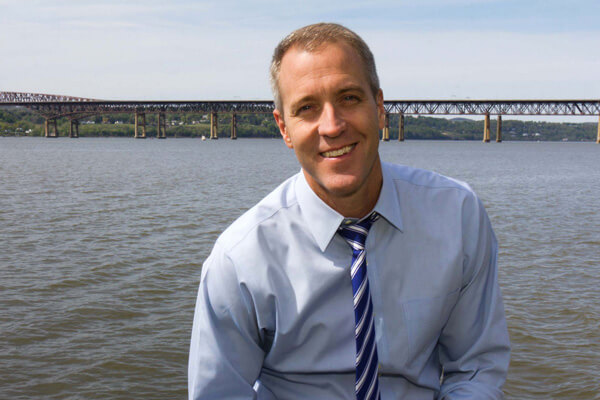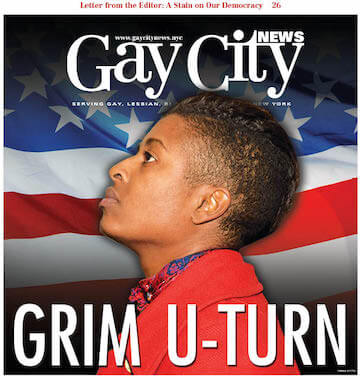Congressman Sean Patrick Maloney. | SEANMALONEY.COM
BY PAUL SCHINDLER | Democrat Sean Patrick Maloney, elected two years ago as New York State’s first openly gay member of Congress, won his reelection bid, in a hard-fought and tight race against the one-term Republican he ousted in 2012.
With 100 percent of the ballots counted in New York’s 18th Congressional District, Maloney had a 1.6 percent lead over former Representative Nan Hayworth. The margin between the two candidates was roughly 2,800 votes, and the tally was unofficial.
Maloney claimed victory on Election Night, but Hayworth took time to review the results before conceding on the afternoon of November 5. In a Facebook post at about 2 p.m., Maloney wrote, “I just received a call from Dr. Hayworth conceding the race. I want to thank her and her supporters for that. We all need to come together now for the sake of the people we serve.”
The district includes all of Rockland and Orange Counties to the northwest of the city and portions of Westchester and Dutchess Counties due north.
Maloney prevailed in a very tough year for his party, where House Republicans made a double-digit gain in their majority, the Democrats lost control of the US Senate, and three Democratic congressional seats in New York State fell to the Republicans. Democratic incumbents Tim Bishop of Long Island and upstate’s Dan Maffei both failed in their reelection bids.
Maloney ran, both this year and in 2012, as a “Clinton Democrat” –– he worked at the White House during the former president’s second term and Hillary Clinton campaigned with him in the contest’s final week –– and on a range of issues he distanced himself from President Barack Obama in the rematch with Hayworth. He criticized the current administration over its handling of Ebola cases in the US, charged that federal oversight had led to “reckless” utility rate increases imposed on the Hudson Valley, faulted Obama for failing to articulate a clear policy toward ISIS, and said he “voted against the president 44 percent of the time” on Obamacare, as much as any Democrat.
Those votes as well as a series of votes on which he sided with Republicans during last fall’s government shutdown sparked criticism from some New York progressives who had backed him in 2012. However, groups that voiced displeasure at the time in comments to Gay City News –– including the Working Families Party and the United Auto Workers –– stood with the 48-year-old Maloney in his reelection campaign.
Though the battle between Maloney and Hayworth was spirited, debates between the two candidates varied little from the template carved out two years ago. Hayworth again voiced a fundamental distrust of government’s role in many aspects of the economy –– especially health care –– and charged that Democrats force “an agenda of burdens” on taxpayers.
Maloney reprised attacks on Hayworth for her ties to Tea Party elements in the Republican Party, whom she courted openly in her initial 2010 campaign. With strong support from women’s groups and choice advocates, the Democrat tied his opponent to efforts by “the House Tea Party leadership” to defund Planned Parenthood. Maloney’s efforts for the women’s vote were aided by Hayworth’s opposition to the Paycheck Fairness Act, which aims to strengthen existing law barring wage differentials between men and women doing the same job.
In at least one debate this year, the two candidates sparred fiercely over the question of marriage equality. Appearing before the Poughkeepsie Journal editorial board. Hayworth, who has an out gay son, noted that New York allows same-sex couples to marry and, with the demise of the Defense of Marriage Act, those marriages are now recognized by the federal government. However, she also said, “The federal government should not impose a definition of marriage on the states,” even while arguing that states should honor all legal marriages from other states. She did not clarify how to square the lack of a federal constitutional right to marry with her view of interstate marriage recognition.
Maloney shot back, “How dare you say that you respect our marriage and wish us well but if we go down to Alabama you’re okay that they discriminate against us? If you are going to represent the State of New York, you have to come to terms with the fact that you are treating my family as less than your own.”
Another gay congressional candidate in New York fared considerably worse than Maloney. Democrat Sean Eldridge, an investor and activist, lost in his bid to represent New York’s 19th Congressional District, in a decisive defeat at the hands of incumbent Republican Chris Gibson. With 100 percent of the vote in, Gibson had bested Eldridge by a 65-35 margin. A first time candidate at 28, Eldridge, who is married to Facebook co-founder and New Republic publisher Chris Hughes, has lived in the district for less than two years. District 19 lies just north of Maloney’s district.
The results demonstrate that Eldridge failed to make the case that the incumbent’s record was too harshly conservative for the district. Two weeks ago, Metro Weekly, a Washington LGBT newspaper, reported that Gibson, who is a sponsor of the federal Employment Non-Discrimination Act, endorsed attaching the measure to the budget’s defense authorization bill. In several debates in the 18th District, Maloney, emphasizing his success at bipartisan initiatives, talked about working with Gibson on a number of issues.






































